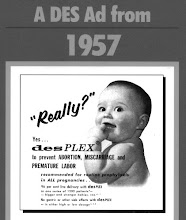Thursday, 29 May 2014
Hunt for a DES drug Biomarker gives hope for
DES exposed Australians
US researchers from the National Cancer Institute are on the hunt for a biomarker to prove prenatal exposure to the anti-miscarriage drug DES (diethylstilboestrol). Using advanced scientific tools and blood donated by recruits from the National Cancer Institute's DES Follow-up Study, it is hoped a biomarker will be discovered by early next year to identify people exposed to DES in the womb.
"A simple blood test to prove DES exposure in the womb would help many Australians previously uncertain of DES exposure to determine their need for special health care," says Carol Devine, coordinator of the support advocacy group DES Action NSW.
"So far successive governments have refused to promote the DES topic directly to the Australian public in health promotion programs due to concern about raising anxiety in people uncertain of DES exposure."
"But this has meant neglecting the rights of all Australians to be informed of the possibility of DES exposure, with the majority of DES exposed people suffering DES effects without knowing why and what they can do about it," adds Devine.
DES was prescribed worldwide to over ten million pregnant women over three decades to prevent miscarriage. In the early 1970s it was linked to clear cell adenocarcinoma of the vagina/cervix in women exposed to DES in the womb. It is now known to cause reproductive problems in DES-exposed offspring and increased risk of breast cancer in women given DES during pregnancy and their daughters of that pregnancy. People exposed to DES during pregnancy and in the womb require lifelong specialised vital health care to help detect DES associated cancers early. DES Action NSW estimates about 740,000 Australians have been exposed to DES.
For DES Awareness Week June 1-7, as well as assisting people learning about their DES exposure for the first time, the DES Action group will be spreading the hopeful news of the DES drug biomarker research. During the Awareness week, June 7 will be set aside to reflect on those who have lost their lives due to DES exposure.
More information about DES can be found at DES Action NSW website: www.desnsw.blogspot.com and on the Cancer Council website at: http://www.cancercouncil.com.au/880/news-media/get-the-facts/cancer-prevention-get-the-facts/cancer-council-new-south-wales-diethylstilbestrol-des-and-cancer/ or by phoning DES Action NSW 02 98754820.
-END-
Information sources:
http://us5.campaign-archive2.com/?u=317818521a5c55131fb1beaf1&id=33b47bfd59&e=a002bf1fe2
http://dceg.cancer.gov/about/staff-directory/biographies/O-Z/hoover-robert
http://www.desfollowupstudy.org/index.asp
Correspondence: Dr Michael Wooldridge 12/10/99, Minister for Health and aged Care (regarding community anxiety with DES exposure information)
For more information or interviews, contact:
Carol Devine
E: c_devine@bigpond.net.au
P: 02 98754820
Subscribe to:
Posts (Atom)


